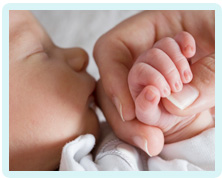
Compensation Following Pressure Sore During Labour
After a prolonged labour, Annie was discharged from hospital only to find that she had sustained a pressure sore on her buttock. Medical practitioners had failed to prevent, diagnose and treat the injury, even though it is considered to be a 'never event'.
When Annie went into labour with her first child she was given an epidural, meaning she could not feel the lower half of her body. She could not move of her own accord, but the midwives did not once change her position or check her pressure areas. This was Annie's first labour so she did not know about the need to change position, nor was she advised to do so.
By the time Annie had been pushing for an hour and a half, concerns were raised about the baby's heart rate. The baby was showing signs of distress, so a ventouse cap was placed on the baby's head. However, after two or three pulls the baby was not delivered. Consequently an episiotomy was performed and a baby boy was delivered by forceps.
Once at home Annie decided to have a bath. It was then that she noticed a purple bruise on her right buttock measuring two to three centimetres in diameter. This had not been detected by medical practitioners in hospital who had failed to check her pressure areas, both during and after labour.
The following day Annie showed the bruise to her community midwife who diagnosed a pressure sore. Nevertheless, no more advice or treatment was provided. The wound soon became extremely painful and began to weep. It was only when the health visitor arrived ten days after the birth that Annie was given the proper advice.
Indeed, the health visitor was very concerned about the pressure sore and told her to visit her GP without delay. She also told Annie that she was shocked she had developed a pressure sore, especially given her young age and the fact that she had spent so little time in hospital.
Annie's GP dressed the wound, but she remained in significant pain for a number of months. Although it did eventually heal, she had been left with a permanent scar below her knicker line. This could have been avoided had the obstetric team taken steps to prevent a pressure sore developing. This should have been done, especially as Annie was at risk of such an injury due to the epidural and the prolonged labour.
Understandably Annie felt traumatised by the care she and her son received while in hospital. She contacted us to discuss what action she could take, and we advised that the hospital did not implement measures to prevent the pressure sore from developing, nor did they make a diagnosis or provide treatment. This amounted to medical negligence.
We helped Annie make a claim against the hospital and she was awarded £5,000 compensation.
(Details which might identify our client have been changed.)
Would You Like Assistance from Specialist Birth Injury Claims Solicitors?
If you would like to benefit from a service of excellence with total commitment to client care from a small and friendly team, Glynns are ready and waiting to help you.
Please call us on 0800 234 3300 (or from a mobile 01275 334030) or complete our Online Enquiry Form.



